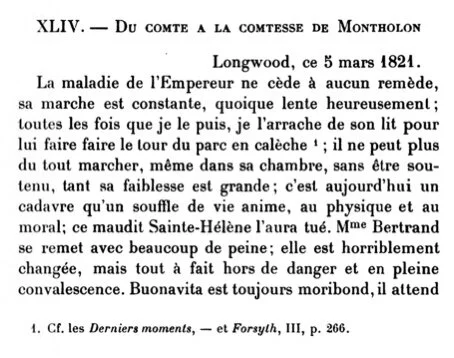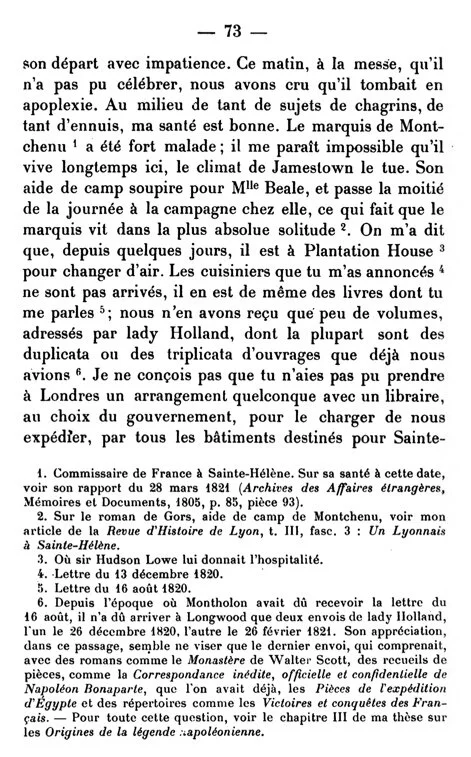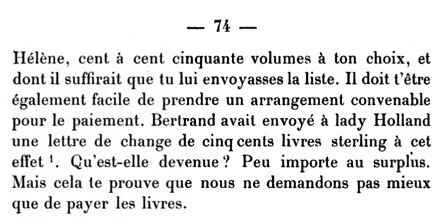Montholon sagt, es ist gut, dass Napoleons Krankheit langsam fortschreitet.
…
The reports on Napoleon’s slow death continue from Count Charles Tristan Montholon de Sémonville to his wife Albine (who was from a very royalist family).
All of these letters were read by the agents of the English government as they passed on their way to Paris, France - which was then run by individuals put in place by the previously mentioned government and their allies.
What is so interesting is that Montholon later gets locked up with Louis Napoleon Bonaparte at the prison of Ham. What happened?
XLIV. - From the COUNT TO THE COUNTESS DE MONTHOLON
Longwood, March 5, 1821.
The Emperor's illness does not give way to any remedy, its progress is constant, though fortunately slow; whenever I can, I tear him out of his bed to make him do the rounds of the park in a carriage (1); he can no longer walk at all, even in his room, without being supported, so great is his weakness; he is today a corpse that the breath of life still animates, physically and morally; that cursed Saint Helena will have killed him.
Madame Bertrand is recovering with great difficulty; she is horribly changed, but quite out of danger and in full recovery. Buonavita is still dying, he is awaiting
…
1. Cf. the Last Moments, - and Forsyth, III, p. 266.
…
his departure impatiently. This morning, at mass, which he was unable to celebrate, we thought he was suffering from apoplexy.
In the midst of so many subjects of sorrow, of so much trouble, my health is good.
The Marquis de Montchenu (1) was very ill; it seems to me impossible that he shall live long here, the climate of Jamestown is killing him.
His aide-de-camp sighs for Miss Beale, and spends half the day in the country with her, which means that the Marquis lives in the most absolute solitude (2)
I have been told that, for several days, he has been at Plantation House (3) for a change of air. The cooks that you announced to me (4) have not arrived, it is the same with the books you tell me about (5); we have received only a few volumes, addressed by Lady Holland, most of which are duplicates or triplicates of works we already had.
I do not understand how you could not have made some arrangement in London with a bookseller, at the choice of the government, to ask them to send us, by all the ships destined for Sainte-
…
1. French Commissioner at Saint Helena. On his health on that date, see his report of March 28, 1821 (Foreign Affairs Archives, Mémoires et Documents, 1805, p. 85, exhibit 93).
2. On the novel by Gors, aide-de-camp of Montchenu, see my article in the Revue d'Histoire de Lyon, t. III, fasc. 3: A Lyonnais in Sainte-Hélène.
3. Where Sir Hudson Lowe Gave Him Hospitality.
4. Letter of December 13, 1820.
5. Letter of August 16, 1820.
6. Since the time when Montholon must have received the letter of August 16, only two items must have arrived at Longwood from Lady Holland, the one on December 26, 1820, the other on February 26, 1821. His assessment, in this passage, seems to relate only to the last shipment, which included, with novels such as Walter Scott's Monastery, collections of plays, such as the Correspondence, unpublished, official and confidential by Napoleon Bonaparte, which we already had, the Pieces of the Egyptian expedition and repertoires like the Victories and Conquests of the French. For all these questions, see chapter III of my thesis on the Origins of the Napoleonic legend.
…
Helena, one hundred to one hundred and fifty volumes of your choice, and of which you just need to send them the list.
It should also be easy for you to make a suitable arrangement for payment. Bertrand had sent Lady Holland a bill of exchange for five hundred pounds to this effect.
What has become of her? It does not matter moreover. But it proves to you that we ask nothing better than to pay for the books.
…
Les rapports sur la mort lente de Napoléon continuent du comte Charles Tristan Montholon de Sémonville à sa femme Albine (qui était d'une famille très royaliste).
Toutes ces lettres ont été lues par les agents du gouvernement anglais alors qu'ils se rendaient à Paris, en France - qui était alors dirigée par des individus mis en place par le gouvernement susmentionné et leurs alliés.
Ce qui est si intéressant, c'est que Montholon est enfermé plus tard avec Louis Napoléon Bonaparte à la prison de Ham. Qu'est-il arrivé?
Die Berichte über Napoleons langsamen Tod gehen von Graf Charles Tristan Montholon de Sémonville bis zu seiner Frau Albine (die aus einer sehr royalistischen Familie stammte) weiter.
Alle diese Briefe wurden von den Agenten der englischen Regierung auf ihrem Weg nach Paris, Frankreich, gelesen - das dann von Personen geleitet wurde, die von der zuvor erwähnten Regierung und ihren Verbündeten eingesetzt wurden.
Was so interessant ist, dass Montholon später mit Louis Napoleon Bonaparte im Gefängnis von Ham eingesperrt wird. Was ist passiert?
…
XLIV. - Vom GRAF ZUR GRÄFIN DE MONTHOLON
Longwood, 5. März 1821.
Die Krankheit des Kaisers weicht keinem Heilmittel, ihr Fortschritt ist konstant, wenn auch glücklicherweise langsam; wann immer ich kann, reiße ich ihn aus seinem Bett, damit er kann reiten in einer Kutsche bewältigt (1); er kann überhaupt nicht mehr gehen, auch nicht in seinem Zimmer, ohne unterstützt zu werden, so groß ist seine Schwäche; es ist heute eine Leiche, die ein Hauch von Leben physisch und moralisch belebt; diese verfluchte Sankt Helena wird ihn getötet haben.
Madame Bertrand erholt sich nur schwer; Sie ist schrecklich verändert, aber völlig außer Gefahr und in voller Genesung.
Buonavita stirbt immer noch, er wartet
…
1. Vgl. Die letzten Momente, - und Forsyth, III, p. 266.
…
seine Abreise ungeduldig.
Heute Morgen, bei der Masse, die er nicht feiern konnte, dachten wir, er leide an Schlaganfall. Inmitten so vieler Themen der Trauer, der Schwierigkeiten ist meine Gesundheit gut.
Der Marquis de Montchenu (1) war sehr krank; es scheint mir unmöglich, dass er lange hier lebt, das Klima von Jamestown bringt ihn um.
Sein Adjutant seufzt nach Miss Beale und verbringt den halben Tag auf dem Land mit ihr, was bedeutet, dass der Marquis in der absolutesten Einsamkeit lebt. (2) Mir wurde gesagt, dass er es seit mehreren Tagen ist im Plantagenhaus (3) für einen Luftwechsel.
Die Köche, die Sie mir angekündigt haben (4), sind nicht angekommen, genauso wie die Bücher, von denen Sie mir erzählen (5);
Wir haben nur wenige Bände erhalten, die von Lady Holland angesprochen wurden. Die meisten davon sind Duplikate oder Triplikate von Werken, die wir bereits hatten.
Ich verstehe nicht, dass Sie in London keine Vereinbarung mit einem Buchhändler nach Wahl der Regierung hätten treffen können, um ihn zu bitten, uns von allen Schiffen zu schicken, die für Sankt
…
1. bestimmt sind. Französischer Kommissar in Sankt Helena. Zu seinem Gesundheitszustand an diesem Datum siehe seinen Bericht vom 28. März 1821 (Foreign Affairs Archives, Mémoires et Documents, 1805, S. 85, Exponat 93).
2. Zum Roman von Gors, Adjutant von Montchenu, siehe meinen Artikel in der Revue d'Histoire de Lyon, t. III, Fasz. 3: Ein Lyoner in Sainte-Hélène.
3. Wo Sir Hudson Lowe ihm Gastfreundschaft schenkte.
4. Brief vom 13. Dezember 1820.
5. Brief vom 16. August 1820.
6. Seit Montholon den Brief vom 16. August erhalten haben muss, dürfen nur zwei Gegenstände von Lady Holland, der einer am 26. Dezember 1820, der andere am 26. Februar 1821. Seine Einschätzung in dieser Passage scheint sich nur auf die letzte Lieferung zu beziehen, die mit Romanen wie Walter Scotts Kloster Sammlungen von Theaterstücken wie die Korrespondenz enthielt unveröffentlicht, offiziell und vertraulich von Napoleon Bonaparte, den wir bereits hatten, die Stücke der ägyptischen Expedition und Repertoires wie die Siege und Eroberungen der Franzosen. Zu all diesen Fragen siehe Kapitel III meiner These über die Ursprünge der napoleonischen Legende.
…
Hélène, einhundert bis einhundertfünfzig Bände nach Ihrer Wahl, von denen Sie ihr nur die Liste schicken müssen.
Es sollte Ihnen auch leicht fallen, eine geeignete Zahlungsvereinbarung zu treffen. Bertrand hatte Lady Holland einen Wechsel von fünfhundert Pfund zu diesem Zweck geschickt.
Was ist aus ihr geworden? Darüber hinaus spielt es keine Rolle. Aber es beweist Ihnen, dass wir nichts Besseres verlangen, als für die Bücher zu bezahlen.
..
For more about the Montholons.
Pour en savoir plus sur les Montholons
Weitere Informationen zu den Montholons.
…




